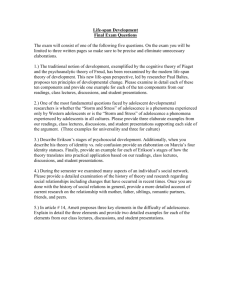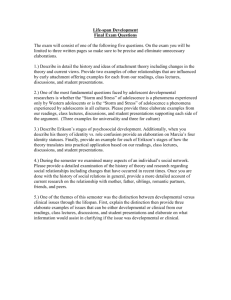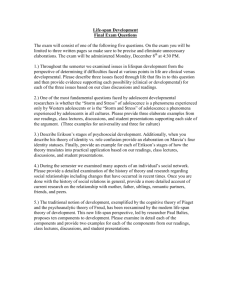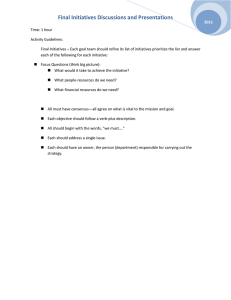Syllabus International Marketing
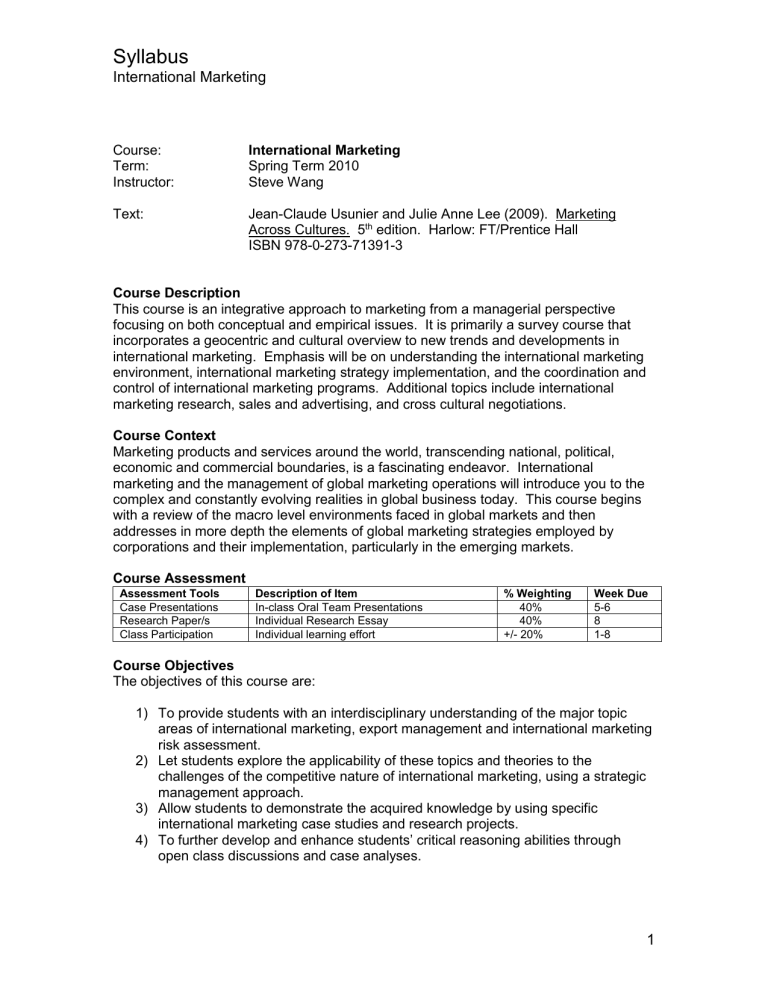
Syllabus
International Marketing
Course:
Term:
International Marketing
Spring Term 2010
Instructor:
Text:
Steve Wang
Jean-Claude Usunier and Julie Anne Lee (2009). Marketing
Across Cultures. 5 th edition. Harlow: FT/Prentice Hall
ISBN 978-0-273-71391-3
Course Description
This course is an integrative approach to marketing from a managerial perspective focusing on both conceptual and empirical issues. It is primarily a survey course that incorporates a geocentric and cultural overview to new trends and developments in international marketing. Emphasis will be on understanding the international marketing environment, international marketing strategy implementation, and the coordination and control of international marketing programs. Additional topics include international marketing research, sales and advertising, and cross cultural negotiations.
Course Context
Marketing products and services around the world, transcending national, political, economic and commercial boundaries, is a fascinating endeavor. International marketing and the management of global marketing operations will introduce you to the complex and constantly evolving realities in global business today. This course begins with a review of the macro level environments faced in global markets and then addresses in more depth the elements of global marketing strategies employed by corporations and their implementation, particularly in the emerging markets.
Course Assessment
Assessment Tools
Case Presentations
Description of Item
In-class Oral Team Presentations
% Weighting Week Due
40% 5-6
Research Paper/s
Class Participation
Individual Research Essay
Individual learning effort
40%
+/- 20%
8
1-8
Course Objectives
The objectives of this course are:
1) To provide students with an interdisciplinary understanding of the major topic areas of international marketing, export management and international marketing risk assessment.
2) Let students explore the applicability of these topics and theories to the challenges of the competitive nature of international marketing, using a strategic management approach.
3) Allow students to demonstrate the acquired knowledge by using specific international marketing case studies and research projects.
4) To further develop and enhance students’ critical reasoning abilities through open class discussions and case analyses.
1
Syllabus
International Marketing
Course Structure
You are expected to attend classes and participate actively in class discussions. The majority of class meetings will be held in a seminar format where class participation includes lectures, current events/news articles, videos, readings and case analyses.
Lectures will involve surveying and discussing concepts presented in the assigned readings and information inherent in your work experiences. While it is during this portion of the class that I will do most of the talking, do keep in mind that a lot of very pertinent details can only be flushed out if you voice your concerns about them.
Case analyses will entail using the knowledge gained from lectures and discussions to interpret, analyze and derive solutions to contemporary international marketing problems and issues. These are meant to be interactive in nature and include information from prior class sessions or courses. In working with case studies, a principal purpose is to have you apply material learned in class to your work environments, and a secondary purpose is to improve your presentation skills and verbal communication skills.
Course Expectations
Every effort within reason will be made by me to facilitate your learning in this class. The willingness, however, will be predicated upon your showing a certain level of interest and effort in understanding the content of the course. Evaluation criteria will include:
1) Completion of all readings, projects, and exercises before each class session for which they are assigned. You are expected to be familiar with the theory and cases presented in the textbook as assigned and all other assigned readings. If for some reason you are not prepared, please let me know before the start of the class. This saves us the embarrassment of my calling on you in class.
2) Taking an active role in class activities. All students are expected to contribute to class discussions. Non-participation will be reflected in your final grade.
3) Please inform me of any expected absences. It is likely that many of you are busy professionals with careers and possibly family obligations. I appreciate this and offer flexibility but please keep me informed of any potential absences.
4) For classroom etiquette, electronic communication devices (i.e. mobile phones, e-mail and text messaging devices, and pagers, etc.) should not be used in class.
While laptops are permitted for note taking, surfing the web is bad etiquette.
5) You need to have a Doane e-mail account for school and provide the address during the first class meeting. You are responsible to keep up with all course related communications including changes to the syllabus, schedule etc. sent by me via e-mail so please monitor your Doane e-mailbox regularly for updates.
6) I will use + and/or - grades but will reserve the right to adjust the final grade up or down by as much as 10%. This adjustment will be based primarily on learning attitude and attendance.
Research Paper
Final grade for this class will be determined by the successful completion and timely submission of a research paper titled “International Marketing and Export Management of a <New Product> to <an Emerging Market> ”. The class will learn ways to screen markets and to assess market potentials from the textbook, lectures and the case studies. You are required to research a real or proposed business: initially identifying a product or service that the firm would like to market in an emerging market. The project is to identify market scope, entry strategies and the corresponding marketing
2
Syllabus
International Marketing
requirements to achieve market penetration in the dynamic and growing emerging markets, especially the BRICA markets.
A first outline of the paper (5 pages) is to be handed in by the beginning of the fifth class meeting. The full paper is due a week after end of term. The anticipated length of the paper would be a minimum of 20 pages excluding bibliography (APA style). A short presentation will also be made to the class during the last class period. I will accept late papers only with prior approved, agreed upon arrangements under extenuating circumstances (i.e. before the due date and to be submitted soon thereafter). These late papers, however, will be deducted at least a half letter grade for each delinquent session.
Throughout the semester additional discussions will be held in class to define the criteria and requirements of the research paper. In the grading of the research paper Doane’s policy regarding academic integrity and plagiarism (including accidental) will be enforced.
Cases
Throughout the semester we will discuss as a class 4-6 case studies on international marketing. Depending on the size of the class several teams may be formed and assigned to work on the cases together. Teams will be formed during the first and second week of class meetings. Each team will work as a unit throughout the semester and group work time will be allocated after each class session as necessary. Each team is required to lead and facilitate one of the pre-assigned cases. The presentation should be 25-30 minutes in length and using presentation tools such as MS Power Point. A
Question and Answer session should follow each presentation lasting no more than 30 minutes. The presenting team will be evaluated on the analysis and organization of the topic, content, business communication skills and professional demeanor. Emphasis of the evaluation will be the knowledge and command of the topic material, depth of analysis and solutions, teamwork and presentation management. Each case study should be approached with the understanding that the cases are self-contained and without the need for additional outside research.
Schedule
TOPIC
Week 1 Introduction, Course Overview, Intro to Marketing
Cultural Processes and Dynamics
ASSIGNMENT
Chapters 1, 2, 3
Week 2 Cross Cultural Consumer Behavior
Cross-cultural Marketing Research
Week 3 Branding, Product Development and Pricing
Market Segmentation, Positioning
Development of the Research Paper
Chapters 4, 5, 6
Chapters 8, 9, 10
Week 4 International Distribution and Channel Strategies
Global Marketing Communication and the Internet
International Advertising
Week 5 International Market Entry Strategies
Case Presentations
Week 6 Case Presentations
Week 7 Organizing Global Marketing Organizations
Week 8 Research Paper Due
* Class topics may be adjusted based on class progress
Chapters 11, 12, 13

